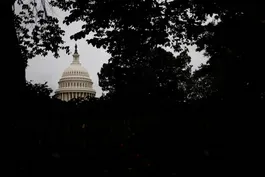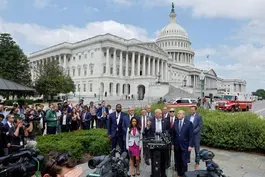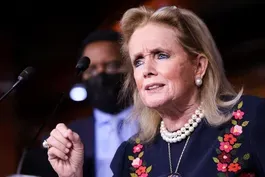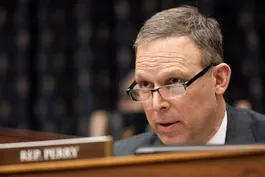
U.S. colleges divided over whether to end legacy admissions
Clip: 5/30/2023 | 5m 47sVideo has Closed Captions
U.S. colleges divided over whether to end legacy admissions
In the coming weeks, the U.S. Supreme Court is expected to issue its ruling on the use of race in college admissions. The case is focusing attention on other practices used in admissions that may need to change, including the children of alumni who often have preference and are often white and affluent. Geoff Bennett discussed legacy applicants with Evan Mandery for our series, Rethinking College.
Major corporate funding for the PBS News Hour is provided by BDO, BNSF, Consumer Cellular, American Cruise Lines, and Raymond James. Funding for the PBS NewsHour Weekend is provided by...

U.S. colleges divided over whether to end legacy admissions
Clip: 5/30/2023 | 5m 47sVideo has Closed Captions
In the coming weeks, the U.S. Supreme Court is expected to issue its ruling on the use of race in college admissions. The case is focusing attention on other practices used in admissions that may need to change, including the children of alumni who often have preference and are often white and affluent. Geoff Bennett discussed legacy applicants with Evan Mandery for our series, Rethinking College.
How to Watch PBS News Hour
PBS News Hour is available to stream on pbs.org and the free PBS App, available on iPhone, Apple TV, Android TV, Android smartphones, Amazon Fire TV, Amazon Fire Tablet, Roku, Samsung Smart TV, and Vizio.
Providing Support for PBS.org
Learn Moreabout PBS online sponsorshipGEOFF BENNETT: In the coming weeks, the U.S. Supreme Court is expected to issue its ruling on the use of race in college admissions, and many court watchers expect the court to further limit or ban the use of race outright.
The case is focusing attention once again on other admissions practices that may need to change, including the legacy applicants, the children of alumni who often have preference and who are overwhelmingly white and from affluent families.
Evan Mandery of the John Jay College of Criminal Justice has studied this closely and wrote a book about it titled "Poison Ivy: How Elite Colleges Divide Us."
He joins us now for our series Rethinking College.
Thank you for being with us.
Why did colleges start giving preference to the children of alumni?
And for the colleges that still use legacy admissions, how do they justify it?
EVAN MANDERY, Author, "Poison Ivy: How Elite Colleges Divide Us": Well, legacy preference actually originated as a specifically antisemitic policy.
It was a way to justify the exclusion of Jews.
And there is no ethical justification for legacy that I have ever heard.
Colleges just say it's what they have always done and they want to continue doing it.
GEOFF BENNETT: Most colleges and universities operate on slim margins.
How do legacy admissions work as a fund-raising tool?
EVAN MANDERY: Well, there's no evidence whatsoever that legacy preference bolsters fund-raising.
And one obvious case in point is MIT, which has never practiced legacy with donor preference, and has an endowment of $25 billion.
And the couple of sociological studies of it have found no relationship between legacy and alumni generosity.
One wouldn't expect there to be one.
GEOFF BENNETT: When you say there's no ethical justification for it, tell me more about that.
EVAN MANDERY: Well, I mean, education is a human right, right?
Access is supposed to be equitable.
And so legacy is just rewarding people for accidents of birth.
And that's not what education is supposed to be about.
GEOFF BENNETT: Through the Supreme Court affirmative action case that we mentioned, some Harvard University admissions data became public.
And it shows that, between the years 2010 and 2015, the acceptance rate for legacy applicants during that period was 33 percent, with a 6 percent overall acceptance rate.
So that's about 5.7 times higher than the acceptance rate for non-legacy applicants.
What does that suggest about the role of wealth and access in the admissions process?
EVAN MANDERY: Right, I mean, that wealth in that affluence is a significant predictor of success in the college admissions process, particularly to -- ironically, to the schools with the highest endowments, the schools that could most afford to be equitable.
And, right, the legacy bump is about six times.
It's higher for donors and the children of faculty and staff.
And for recruited athletes, it's about a 16 times' multiplier.
And it's important to remember that, overwhelmingly, right -- people only watch Division I college football and basketball.
So they think there's significant Black representation.
But almost all of the sports at these colleges favor affluent whites.
GEOFF BENNETT: For those elite institutions that have eased off the practice of using legacy preferences, how have they done it and what has it meant for their enrollments?
EVAN MANDERY: Well, it's had no discernible impact on their enrollment whatsoever.
I mean, two things with legacy, right?
One is who we let in, and two is the stories that we tell about the people that we let in.
So, legacy is a way of legitimating affluent people's admission, but what's worse about it is that creates the myth that the people that are being admitted are the best and the brightest, as opposed to many of the rich and the richest.
GEOFF BENNETT: Well, Vincent Price, the president of Duke University, he's among those defending the practice.
And he said to his faculty last year: "We are an institution that was made in a family, the Duke family.
We bear the name of that family.
We represent family.
We talk about family.
So how does that translate into the way we behave?
The idea that you would ban legacy admissions or ban any particular factor as a consideration is troublesome."
There are lots of people who will hear that and think that that makes sense.
What's your argument against it?
EVAN MANDERY: Oh, it's a painful argument to listen to from a college president.
I mean, those are the types of arguments that plantation owners used to defend slavery.
I mean, it can't just be that it's because the way we have always done it, that that's an ethical defense of continuing an offensive practice.
GEOFF BENNETT: But why can't private institutions use the admission systems that they deem appropriate to arrive at a class that reflects a diversity of backgrounds and world views?
EVAN MANDERY: I think that's a great question, Geoff.
But I'm going to say, they can do whatever they want.
The question is whether they are going to be entitled to nonprofit status, right?
So, elite colleges collectively receive tax benefits which the sociologist Charlie Eaton has estimated to be worth about $20 billion a year.
So, if they're going to get a right - - and because your contribution to your alma mater is tax-exempt, their earnings on the endowment are tax-exempt, and all of these colleges get preferential treatment in real estate and state taxes.
So, if they're going to do that, then they need to act in the public interest.
If what they want to do is act as for-profit colleges, then they should say that that's what their business is, and then they would be able to do whatever they want, so long as it doesn't explicitly violate the Constitution.
GEOFF BENNETT: Evan Mandery is a professor with the John Jay College of Criminal Justice.
Thanks for your time.
EVAN MANDERY: Thank you.
Blend of science and art improving neurological health
Video has Closed Captions
How a blend of science and art is improving neurological health (7m 45s)
Could drone attacks change how Russian people perceive war?
Video has Closed Captions
Could drone attacks in Moscow change how Russian people perceive Putin's war in Ukraine? (8m 24s)
Debt battle in House where some in both parties oppose it
Video has Closed Captions
Debt ceiling and budget battle now in House where some in both parties oppose it (3m 14s)
Debt ceiling deal faces 1st hurdle in House Rules Committee
Video has Closed Captions
Debt ceiling agreement expected to clear 1st hurdle in House Rules Committee (4m 17s)
Democratic Rep. Dingell discusses concerns with debt deal
Video has Closed Captions
Democratic Rep. Debbie Dingell discusses her concerns with the debt deal (6m 22s)
GOP Rep. Scott Perry on why he will not back debt limit deal
Video has Closed Captions
Republican Congressman Scott Perry on why he will not back the debt limit deal (6m 42s)
How Rosalynn Carter reduced stigma around mental health
Video has Closed Captions
How Rosalynn Carter reduced stigma around mental health and caregiving (5m 59s)
Providing Support for PBS.org
Learn Moreabout PBS online sponsorshipMajor corporate funding for the PBS News Hour is provided by BDO, BNSF, Consumer Cellular, American Cruise Lines, and Raymond James. Funding for the PBS NewsHour Weekend is provided by...


















